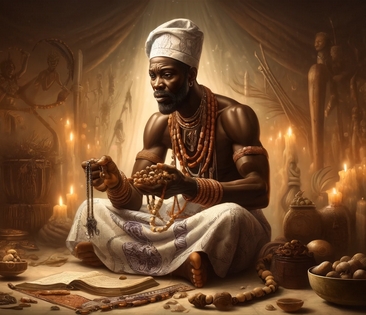
support@yorubalibrary.com
+2348073529208, 07038599574

Yoruba traditional spiritual leaders hold a pivotal role in the cultural and religious landscape of the Yoruba people. These leaders, often revered and respected, guide their communities through spiritual practices, rituals, and the preservation of cultural heritage. This article highlights the roles, responsibilities, and significance of Yoruba traditional spiritual leaders.
Introduction to Yoruba Traditional Spiritual Leaders
In Yoruba culture, spirituality is deeply interwoven with daily life, and spiritual leaders play a crucial role in maintaining the balance between the physical and spiritual worlds. These leaders include priests, priestesses, diviners, and herbalists, each serving unique and essential functions within the community.
Key Roles and Responsibilities
1. Babalawo and Iyanifa: The Babalawo (male priest) and Iyanifa (female priestess) are the primary custodians of the Ifa divination system. They are trained in the intricate knowledge of Ifa, the deity of wisdom and divination, and use divination tools such as Opele (divining chain) and Ikin (sacred palm nuts) to interpret messages from the spiritual realm. Their guidance is sought for personal decisions, community issues, and major life events.
2. Onisegun (Herbalists): Onisegun are traditional healers who use herbs, roots, and other natural elements to cure illnesses and provide remedies. They possess extensive knowledge of Yoruba medicine and play a vital role in the health and well-being of the community.
3. Olorisha and Orisha Priests/Priestesses: These spiritual leaders are dedicated to specific Orishas (deities) within the Yoruba pantheon. They conduct rituals, offer sacrifices, and lead ceremonies to honor their respective deities. Each Orisha has its own set of practices and traditions, and the priests and priestesses ensure these are upheld.
4. Egungun Priests: Egungun priests oversee the veneration of ancestral spirits. The Egungun festival, which involves masquerades and elaborate rituals, is one of the key responsibilities of these priests. They facilitate communication between the living and the ancestors, seeking blessings and guidance.
Significance of Yoruba Traditional Spiritual Leaders
Yoruba traditional spiritual leaders are not just religious figures; they are custodians of culture, mediators of conflict, and educators within their communities.
1. Preservation of Cultural Heritage: Spiritual leaders play a crucial role in preserving and transmitting Yoruba cultural and religious traditions. Through rituals, festivals, and oral teachings, they ensure that cultural heritage is passed down through generations.
2. Community Cohesion and Guidance: These leaders act as mediators in disputes and provide counsel during crises. Their wisdom and authority help maintain social harmony and collective identity within the community.
3. Spiritual and Moral Education: Spiritual leaders educate the community on moral and ethical principles, often derived from Yoruba cosmology and mythology. They instill values such as respect, humility, and communal responsibility.
4. Healing and Well-being: Through their knowledge of herbal medicine and spiritual healing practices, Yoruba spiritual leaders contribute to the physical and mental well-being of individuals. They address both spiritual and health-related issues, offering holistic care.
Challenges and Modern Adaptations
While Yoruba traditional spiritual leaders continue to play vital roles, they face challenges in the modern world, including the influence of global religions and modernization.
1. Modernization and Urbanization: The migration to urban areas and the adoption of modern lifestyles have affected traditional practices. However, many spiritual leaders are adapting by integrating modern elements into their practices and using digital platforms to reach a wider audience.
2. Interfaith Dynamics: The presence of Christianity and Islam in Yoruba communities has led to a blend of religious practices. Some Yoruba spiritual leaders engage in interfaith dialogues and find ways to coexist with other religious traditions.
3. Preservation Efforts: Efforts are being made to document and preserve Yoruba spiritual practices through written records, documentaries, and academic research. These initiatives help safeguard the rich heritage of Yoruba spirituality for future generations.
Conclusion
Yoruba traditional spiritual leaders are central figures in the cultural and spiritual life of the Yoruba people. Their roles in preserving heritage, guiding the community, and promoting well-being are invaluable. Despite modern challenges, these leaders continue to adapt and uphold the rich traditions of Yoruba spirituality, ensuring their relevance and continuity in contemporary society.

Learn about the Yoruba concept of Ìwà Pẹ̀lẹ́ (good…

Learn special praises for Divine Being and Creator…